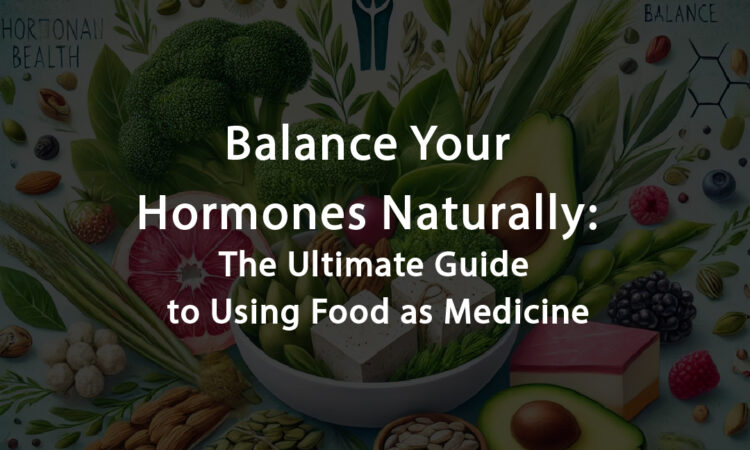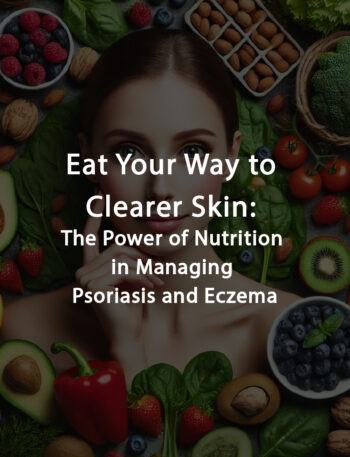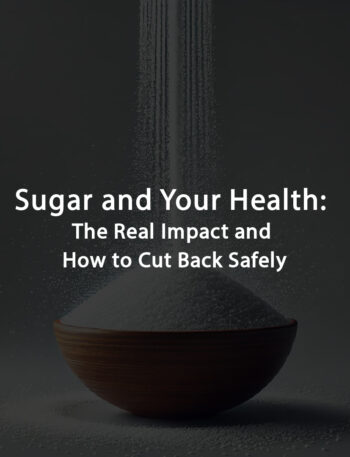Hormones are the body’s chemical messengers, playing a critical role in regulating various physiological processes, including metabolism, growth, mood, and reproductive health. These messengers are produced by the endocrine glands and travel through the bloodstream to tissues and organs, affecting many different functions over time. Hormonal balance is crucial for overall well-being, and even slight imbalances can lead to significant health issues.
Hormonal imbalances occur when there is too much or too little of a hormone in the bloodstream. Because of their essential role in the body, even small hormonal imbalances can cause side effects throughout the body. These imbalances can be due to several factors, including lifestyle, diet, environmental toxins, stress, and underlying medical conditions.
In this article, we will delve into the nature of hormonal imbalances, explore the role of diet in maintaining hormonal balance, and provide practical advice on what to eat and what to avoid. We will also include case studies with references to scientific research that demonstrate the impact of diet on hormonal health.
Understanding Hormonal Imbalances
What Are Hormones?
Hormones are vital substances produced by various glands in the body’s endocrine system. They regulate a multitude of bodily functions, such as:
- Metabolism: The process by which your body converts what you eat and drink into energy.
- Growth and Development: Hormones play a crucial role in physical growth and development.
- Mood and Stress: Hormones like cortisol and adrenaline manage the body’s stress response.
- Reproductive Processes: Hormones like estrogen, progesterone, and testosterone are central to reproductive health.
- Sleep: The hormone melatonin regulates sleep cycles.
Given the wide range of functions controlled by hormones, it’s easy to see how a hormonal imbalance can lead to health issues.
Causes of Hormonal Imbalances
Hormonal imbalances can occur due to various factors:
- Diet: Consuming too much sugar, processed foods, and unhealthy fats can disrupt hormone production.
- Stress: Chronic stress elevates cortisol levels, leading to imbalances in other hormones like insulin and thyroid hormones.
- Environmental Toxins: Chemicals found in plastics, cosmetics, and pesticides can disrupt the endocrine system.
- Medical Conditions: Conditions like PCOS, thyroid disorders, and diabetes are directly related to hormonal imbalances.
- Aging: Natural aging processes, such as menopause and andropause, lead to changes in hormone levels.
- Lack of Physical Activity: Sedentary lifestyles can contribute to hormonal imbalances, particularly those related to metabolism.
Common Hormonal Imbalance Disorders
- Polycystic Ovary Syndrome (PCOS): Affects women’s hormone levels, leading to issues like irregular periods, infertility, and weight gain.
- Hypothyroidism: The thyroid gland does not produce enough thyroid hormone, leading to fatigue, weight gain, and depression.
- Hyperthyroidism: The thyroid gland produces too much thyroid hormone, causing weight loss, anxiety, and rapid heartbeat.
- Adrenal Fatigue: Chronic stress exhausts the adrenal glands, leading to imbalanced cortisol levels.
- Insulin Resistance: The body’s cells become less responsive to insulin, leading to high blood sugar levels and potentially type 2 diabetes.
The Role of Diet in Hormonal Health
The food you eat can have a profound impact on hormone levels. Nutrient-rich foods support hormone production and regulation, while processed foods and those high in sugar and unhealthy fats can lead to imbalances. Here’s how different nutrients and foods influence hormonal health:
Key Nutrients for Hormonal Balance
- Healthy Fats:
- Omega-3 Fatty Acids: Found in fatty fish like salmon, walnuts, and flaxseeds, omega-3s help reduce inflammation and support the production of hormones like estrogen and progesterone.
- Saturated Fats: Despite their bad reputation, healthy sources of saturated fats like coconut oil can support the production of certain hormones, including cortisol and testosterone.
- Proteins and Amino Acids:
- Essential Amino Acids: Proteins provide the building blocks for hormone synthesis. Foods like eggs, lean meats, and legumes are excellent sources of protein.
- Collagen: Found in bone broth and supplements, collagen supports skin health and hormone production.
- Vitamins and Minerals:
- Vitamin D: Supports thyroid function and overall hormonal balance. Sources include sunlight, fatty fish, and fortified foods.
- Magnesium: Found in leafy greens, nuts, and seeds, magnesium helps regulate cortisol levels and supports sleep.
- Zinc: Essential for hormone production and immune function. Foods rich in zinc include shellfish, meat, and pumpkin seeds.
- B Vitamins: Important for energy production and mood regulation, B vitamins are found in whole grains, meat, and eggs.
- Antioxidants:
- Vitamin C: Supports adrenal health and reduces cortisol levels. Found in citrus fruits, berries, and bell peppers.
- Selenium: An antioxidant that supports thyroid health, found in Brazil nuts, fish, and eggs.
- Fiber:
- Fiber helps regulate blood sugar levels, supports gut health, and promotes the elimination of excess hormones. Sources include vegetables, fruits, and whole grains.
Foods That Promote Hormonal Balance
Incorporating these foods into your diet can help maintain and restore hormonal balance:
- Healthy Fats:
- Avocados: Rich in monounsaturated fats and fiber, avocados support healthy cholesterol levels and hormone production.
- Nuts and Seeds: Almonds, walnuts, flaxseeds, and chia seeds are excellent sources of omega-3 fatty acids.
- Fatty Fish: Salmon, mackerel, and sardines are high in omega-3s, which help reduce inflammation and balance hormones.
- Cruciferous Vegetables:
- Broccoli: Contains compounds that support estrogen metabolism.
- Kale: High in fiber and antioxidants, kale supports detoxification.
- Brussels Sprouts: Supports liver detoxification, aiding in the elimination of excess hormones.
- Fermented Foods:
- Yogurt: Probiotic-rich foods like yogurt support gut health and hormone regulation.
- Kimchi: This fermented Korean dish is rich in probiotics and antioxidants.
- Sauerkraut: Fermented cabbage provides beneficial bacteria for gut health.
- Whole Grains:
- Quinoa: A complete protein and high in fiber, quinoa helps regulate blood sugar levels.
- Brown Rice: Rich in magnesium and B vitamins.
- Oats: High in fiber and antioxidants, oats help stabilize blood sugar levels.
- Leafy Greens:
- Spinach: Rich in magnesium, iron, and antioxidants.
- Swiss Chard: High in vitamins A, C, and K.
- Arugula: Supports liver detoxification and hormone metabolism.
- Fruits Rich in Antioxidants:
- Berries: Blueberries, strawberries, and raspberries are packed with antioxidants.
- Citrus Fruits: Oranges, lemons, and grapefruits are high in vitamin C.
- Pomegranates: Rich in antioxidants and anti-inflammatory compounds.
- Adaptogenic Herbs:
- Ashwagandha: Helps balance cortisol levels and reduce stress.
- Maca Root: Supports reproductive health and balances hormones.
- Rhodiola: Helps the body adapt to stress and supports adrenal health.
- Proteins and Amino Acids:
- Eggs: Provide essential amino acids for hormone production.
- Lean Meat: Chicken, turkey, and lean cuts of beef provide high-quality protein.
- Legumes: Beans, lentils, and chickpeas support hormone production and gut health.
- Hydration:
- Drinking plenty of water is crucial for hormone balance. Herbal teas like chamomile or green tea also have additional health benefits.
Foods to Avoid for Hormonal Health
Certain foods can disrupt hormonal balance and should be limited or avoided:
- Processed Foods:
- High in unhealthy fats, refined sugars, and artificial additives, processed foods contribute to inflammation and insulin resistance.
- Sugary Foods and Drinks:
- High sugar intake can lead to insulin resistance and weight gain. Limit sugary snacks and drinks like soda.
- Refined Carbohydrates:
- Foods like white bread and pasta can cause blood sugar spikes, leading to insulin resistance.
- Trans Fats:
- Found in fried foods and baked goods, trans fats increase inflammation and disrupt hormone production.
- Excessive Caffeine:
- Too much caffeine can elevate cortisol levels, disrupt sleep, and lead to adrenal fatigue.
- Alcohol:
- Alcohol can disrupt hormone production, dehydrate the body, and increase cortisol levels.
- Dairy (for some individuals):
- Dairy products can trigger inflammation and hormonal imbalances in some people.
Click here for a 7 days diet plan for the same!
Lifestyle Tips for Maintaining Hormonal Balance
In addition to diet, certain lifestyle changes can play a crucial role in maintaining hormonal health:
Regular Exercise: Physical activity helps regulate hormones by improving insulin sensitivity, reducing cortisol levels, and supporting weight management.
Stress Management: Chronic stress is a major contributor to hormonal imbalances. Incorporate stress-reducing practices like mindfulness, meditation, yoga, and deep breathing exercises.
Sleep Hygiene: Quality sleep is essential for hormone regulation. Aim for 7-9 hours of sleep per night and create a bedtime routine that promotes relaxation.
Reducing Exposure to Environmental Toxins: Avoid plastics, pesticides, and synthetic chemicals in personal care products. Opt for organic foods and natural products whenever possible.
Importance of Regular Health Check-ups: Regular check-ups can help detect hormonal imbalances early and allow for timely intervention.
The Role of Supplements in Hormonal Health
While a balanced diet is the foundation of hormonal health, supplements can provide additional support when needed. Always consult with a healthcare provider before starting any new supplements.
Common Supplements for Hormonal Balance:
- Omega-3 Fatty Acids: Fish oil supplements reduce inflammation and support hormone production.
- Magnesium: Helps reduce cortisol levels and improve sleep.
- Vitamin D: Essential for immune function and hormone regulation.
- Probiotics: Support gut health and hormone balance.
- Herbal Supplements: Adaptogens like ashwagandha and rhodiola help balance cortisol and reduce stress.
Hormonal imbalances can significantly impact your health, but with the right dietary and lifestyle changes, you can take control and improve your quality of life. By focusing on a nutrient-dense diet, avoiding inflammatory foods, and incorporating stress management techniques, you can support your body’s natural hormone production and maintain balance.
Achieving hormonal balance is a journey that requires patience and persistence. Listen to your body, make gradual changes, and seek guidance from healthcare professionals when needed.
Take charge of your hormonal health today by making informed dietary choices and embracing a balanced lifestyle. With the right approach, you can restore harmony to your hormones and live a vibrant, healthy life.






